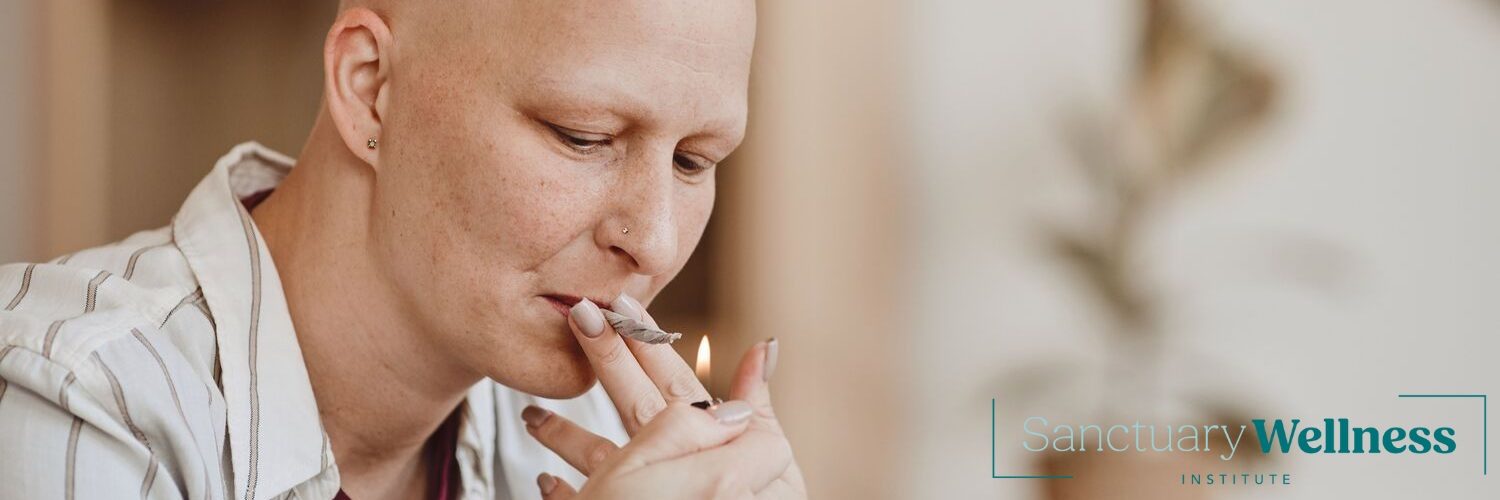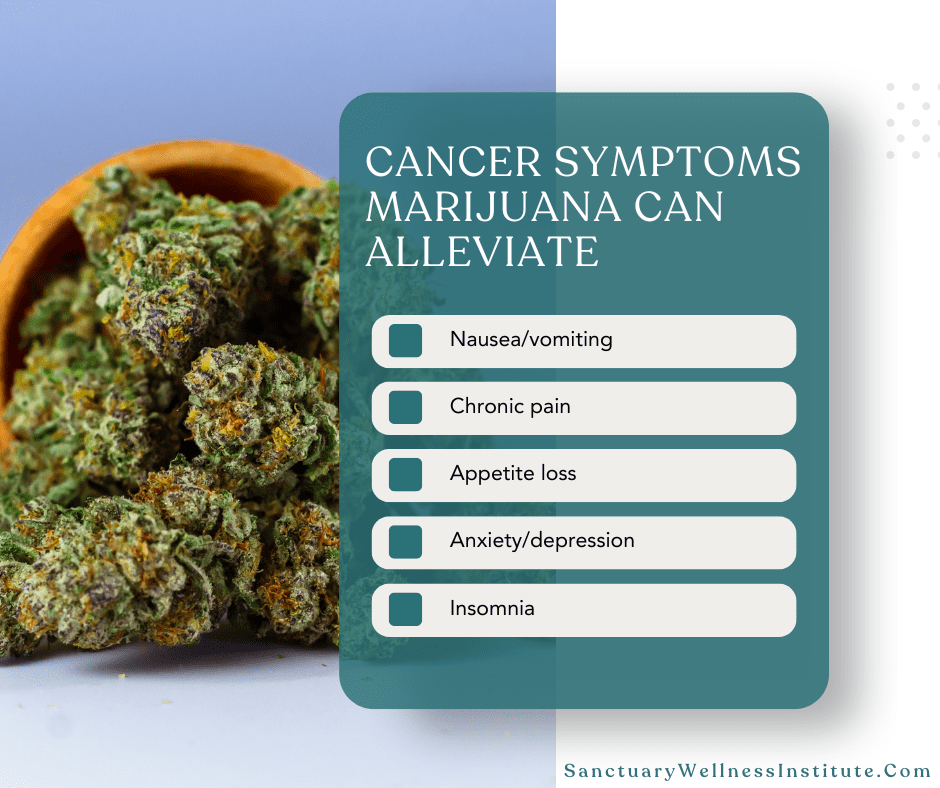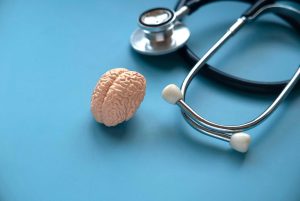Medical Marijuana for Cancer & Chemotherapy
- John DiBella
- Published: September 18, 2024
- Fact-checked by Dr. Desiree Granados

From reducing nausea and vomiting to improving appetite and mood, medical marijuana presents a promising alternative for patients dissatisfied with traditional cancer treatment. In this article, we’ll unpack the science behind medical marijuana for cancer, whether you can get an MMJ card for cancer, and more.
Does Marijuana Help with Cancer Symptoms?
Research suggests that marijuana may help alleviate certain cancer symptoms, as well as the side effects of cancer treatment. However, much of the evidence is anecdotal, and there’s no conclusive evidence that cannabis is superior to other cancer treatments.
Which Cancer or Chemotherapy Symptoms Does Marijuana Alleviate?
Medical marijuana can alleviate the following symptoms of cancer and chemotherapy:
- Nausea and Vomiting: Marijuana is well-known for its antiemetic properties, helping reduce the nausea and vomiting associated with chemotherapy treatment.
- Pain: Cannabinoids can have analgesic effects, alleviating chronic pain and discomfort related to cancer and its treatment.
- Loss of Appetite: Medical marijuana can stimulate appetite, helping cancer patients maintain a healthy weight and improve their overall quality of life.
- Anxiety and Depression: The calming effects of marijuana may help reduce anxiety and depressive symptoms that some cancer patients experience.
- Insomnia: Marijuana’s sedative properties can promote better sleep patterns for patients struggling with insomnia due to pain or anxiety.

Can You Get a Medical Card for Cancer?
You can indeed get a medical marijuana card for cancer as long as your home state permits it. In many jurisdictions, cancer is listed as a qualifying condition for medical cannabis. And in some others, doctors are permitted to prescribe medical marijuana for any patient they believe would benefit from it.
Note that in Maryland, although “cancer” is not listed as a qualifying condition, the state allows doctors to recommend marijuana if the patient suffers from “any severe condition for which other medical treatments have been ineffective.”
Also note that New York, Virginia, and Washington D.C. don’t hold patients to specific qualifying condition lists. Instead, doctors may approve medical cannabis for any condition, including cancer or its symptoms.
The Sanctuary Wellness Institute operates in numerous states that issue medical cards for cancer, including Pennsylvania, Florida, Arkansas, and Connecticut. See our interactive map “Marijuana Laws by State” for more info about the medical marijuana regulations where you live.
How to Use Marijuana to Help with Cancer or Chemotherapy Symptoms
The most effective ways to consume medical cannabis for cancer and chemotherapy include:
- Smoking: Smoking weed from joints, pipes, or vaporizers allows for fast absorption and immediate relief of symptoms like nausea and pain.
- Vaporizing: Using a vaporizer heats the marijuana to a temperature that releases cannabinoids without combustion, making it a healthier alternative to smoking that still provides quick relief.
- Edibles: Marijuana-infused foods like gummies or brownies offer longer-lasting effects, though the onset can take anywhere from 30 minutes to two hours. These products can be useful for managing persistent symptoms.
- Tinctures: These are alcohol-based extracts of marijuana that can be taken sublingually (under the tongue) for rapid absorption. Tinctures allow for precise dosing and are easy to use.
- Topicals: Creams, balms, or lotions infused with cannabis can be applied directly to the skin to provide localized relief for pain or inflammation. They don’t cause any psychoactive effects.
- Capsules: These contain measured doses of cannabis oil and provide a convenient option for those who prefer not to smoke or vape their cannabis. However, the effects may take longer to set in compared to inhalation methods.
Ultimately, the best type of medical marijuana for you will depend on your condition and the symptoms you’re seeking to address. The Sanctuary recommends consulting a physician before using cannabis.

What Are the Best Marijuana Strains for Cancer Symptoms?
Though different people prefer different cannabis strains, cancer patients tend to favor indica strains for their sedative effects. Some of the best strains for those seeking to alleviate cancer symptoms include:
- ACDC: High in CBD and low in THC, ACDC is known for its calming effects. It can help alleviate pain and reduce anxiety, making it a great option for cancer patients.
- Harlequin: This strain has a balanced THC to CBD ratio, providing mild psychoactive effects while mitigating pain and inflammation.
- Charlotte’s Web: Famous for its high CBD content, this strain is often used to reduce anxiety, providing a sense of calm and relief.
- Blue Dream: A hybrid strain that combines the effects of sativa and indica, Blue Dream is known for its ability to relieve pain and stimulate appetite.
- GSC (Girl Scout Cookies): With a balanced THC to CBD ratio, GSC can help combat severe pain and nausea.
- OG Kush: Renowned for its strong pain-relieving properties, OG Kush can alleviate headaches and chronic pain while also stimulating appetite.
Ultimately, the most effective strains for you will depend on your condition and the symptoms you’re seeking to alleviate.
What Are the Potential Risks and Side Effects of Using Cannabis for Cancer?
While medical marijuana can provide many benefits for cancer patients, there are also some risks to using it for that purpose. The most notable ones include:
- Psychoactive Effects: Patients may experience altered mental states, dizziness, or confusion, particularly with THC-rich strains.
- Dependency and Withdrawal: Regular use can lead to cannabis dependence, in which case withdrawal symptoms could occur when the patient goes off the drug.
- Impaired Coordination: Cannabis use can impair motor skills and coordination, increasing your risk of accidents and falls.
- Mood Changes: Some users may experience changes in mood or mental health, including anxiety or paranoia.
- Interactions with Medication: Cannabis may interact with other medications, potentially compromising their efficacy or exacerbating their side effects.
As long as you follow your doctor’s instructions, your odds of experiencing the aforementioned effects will be minimal. Be sure to consult a physician before using cannabis for cancer or chemotherapy.
Conclusion
In summary, medical marijuana represents a promising treatment option for cancer patients grappling with a range of symptoms. From managing pain and anxiety to stimulating appetite and improving sleep quality, its therapeutic benefits are numerous. However, it’s to approach cannabis use with caution and consult a physician before using it.
If you’re seeking to use medical cannabis for cancer or another qualifying condition, The Sanctuary Wellness Institute can connect you with a medical marijuana doctor and guide you through the process of applying for an MMJ card. Book an evaluation today to find out whether you’re eligible.
Frequently Asked Questions
Can marijuana cure cancer?
There is no conclusive evidence to suggest that marijuana can cure cancer. While some preliminary research has shown that cannabinoids may slow the growth of certain types of cancer cells, more rigorous clinical trials are needed to fully understand their therapeutic efficacy.
Can marijuana cause cancer?
Some studies suggest that marijuana smoke contains many of the same carcinogenic compounds as tobacco smoke, which could potentially increase one’s risk of lung cancer. However, other research shows no correlation.
Further research is necessary to fully understand the long-term implications of marijuana use.
How quickly does marijuana work for nausea?
When cannabis is smoked or vaporized, users typically experience nausea relief within minutes, as the compounds enter the bloodstream through the lungs. In contrast, edible forms of marijuana may take 30 minutes to two hours to take effect since they must be metabolized in the digestive system before entering the bloodstream.
Overall, the speed at which marijuana alleviates your nausea will depend on your metabolism, the specific strain used, and the method of consumption you choose.
States Where We Offer Medical Marijuana Card Services
How we reviewed this article:
- Joy J. Mack (2000). Marijuana as Medicine? The Science Beyond the Controversy.
https://www.ncbi.nlm.nih.gov/books/NBK224387/ - Takeda Oncology (2021). Medical Marijuana and Cancer
https://www.cancercare.org/publications/328-medical_marijuana_and_cancer - American Cancer Society (2022). Marijuana and Cancer
https://www.cancer.org/cancer/managing-cancer/treatment-types/complementary-and-integrative-medicine/marijuana-and-cancer.html - David McNamee (2015). Cannabis reduces tumor growth in study
https://www.medicalnewstoday.com/articles/279571 - S. Aldington, M. Harwood, B. Cox, M. Weatherall, L. Beckert, A. Hansell, A. Pritchard, G. Robinson, R. Beasley (2008). Cannabis use and risk of lung cancer: a case–control study
https://erj.ersjournals.com/content/31/2/280 - National Academies of Sciences, Engineering, and Medicine; Health and Medicine Division; Board on Population Health and Public Health Practice; Committee on the Health Effects of Marijuana. (2017) The Health Effects of Cannabis and Cannabinoids: The Current State of Evidence and Recommendations for Research.
https://www.ncbi.nlm.nih.gov/books/NBK425761/
Current Version
September 18, 2024
Written By
John DiBella
Fact-checked By
Dr. Desiree Granados
Editorial Process
Our Editorial Process

John DiBella is the co-founder and CEO at The Sanctuary Wellness Institute. His goal is to foster healthier lifestyles to improve individuals’ quality of life and health span through online medical and non-medical services. When he’s not writing health & wellness articles for The Sanctuary, he enjoys hiking, camping, surfing and sailing.







